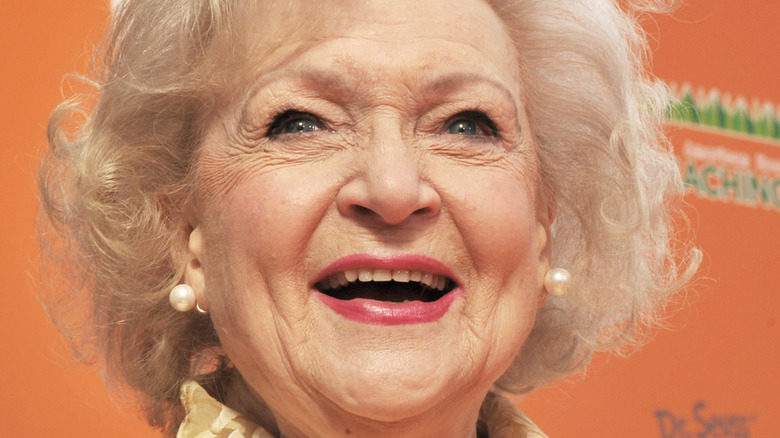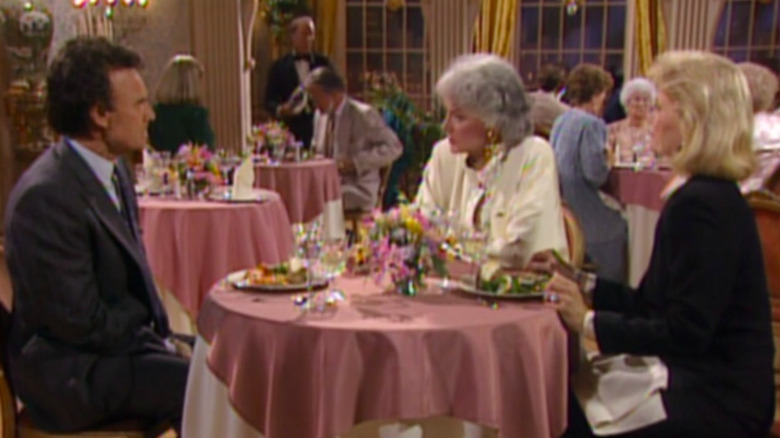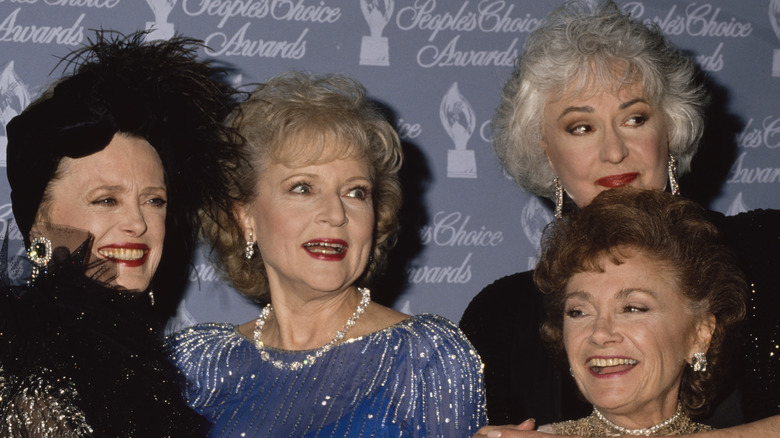Golden Girls Fans Agree This Is The Most Satisfying Scene In The Whole Series
Starring Bea Arthur, Rue McClanahan, Betty White, and Estelle Getty, "The Golden Girls" is just as funny today as it was when it first premiered. Standing the test of time isn't something every piece of media can pull off. Often it's the case that television shows and movies have to be viewed through the lens of when they were made and the societal changes that have come since. Thankfully, viewers can enjoy the antics of Dorothy (Arthur), Rose (White), Blanche (McClanahan), and Sophia (Getty) without wading through a swamp of problematic rhetoric.
Although certain aspects of the show haven't aged well, one of the show's many strengths was its ability to explore hard-hitting storylines in between monologues about Rose's life in St. Olaf and Sophia's exaggerated tales of Sicily. The best episodes of the show are the ones that embrace both hardship and humor. As women of a certain age, the heroines face ageism and sexism throughout the course of the show, though there's one storyline that has a particularly rewarding payoff. Let's take a look at what fans point to as the most satisfying scene in the entire show.
Dorothy advocates for herself
In the Season 5 finale, a two-parter aptly titled "Sick and Tired," Dorothy is afflicted by the sudden onset of several alarming ailments. Her first instinct is to visit the doctor, who tells her that she's perfectly healthy. Despite his condescension, Dorothy demands another opinion. She travels all the way to New York City, where another, even more patronizing physician named Dr. Budd (Michael McGuire) tells her that the illness is all in her head. Budd's assessment leaves Dorothy feeling hopeless. Seeing her reduced to tears is heartbreaking to watch, as Dorothy is typically portrayed as the most stoic of the main characters.
Thankfully, a third doctor diagnoses Dorothy with chronic fatigue syndrome, finally granting her the validation she'd been so cruelly denied. The girls all go out to dinner to celebrate, but Dorothy is struck with inspiration when she notices Dr. Budd eating with his wife at a nearby table. She confronts him and delivers an empowering monologue about being forced to advocate for her own well-being in the face of apathetic medical professionals. It's a masterfully written scene that conveys the depths of her pain and resilience. The storyline is so poignant that it still hits home decades after it first aired. "As someone struggling with health issues and fighting for a diagnosis, this resonates with me to this day," wrote Reddit u/illuminaughtyxox. The scene is undoubtedly inspirational, though it might surprise you to learn that this particular plotline was no coincidence.
The storyline was inspired by true events
Taking time to address serious issues is nothing new for "The Golden Girls," which featured storylines that worked to destigmatize homophobia, antisemitism, and the AIDS epidemic. "Sick and Tired" not only provides an opportunity for Bea Arthur to showcase the breadth of her acting skills but also allows the narrative to examine a serious topic while still including the humor audiences are used to. This balance was achieved with the help of series creator Susan Harris, who faced her own health issues while the series was in production.
"The chronic fatigue one was actually something that I was personally going through at the time," Harris told Vulture in a recent interview. "So the episode was my way at getting back at all the doctors who didn't believe me; my revenge script for all the people out there who had a disease like that."
The deeply personal nature of Harris' experience imbued within the story is what makes the installment so moving. Although Harris ultimately found out that she was suffering from an adrenal issue rather than chronic fatigue syndrome, the episode's message about prioritizing one's health still rings true. The fact that Dorothy's speech is still relevant is a testament to the show's timelessness.


